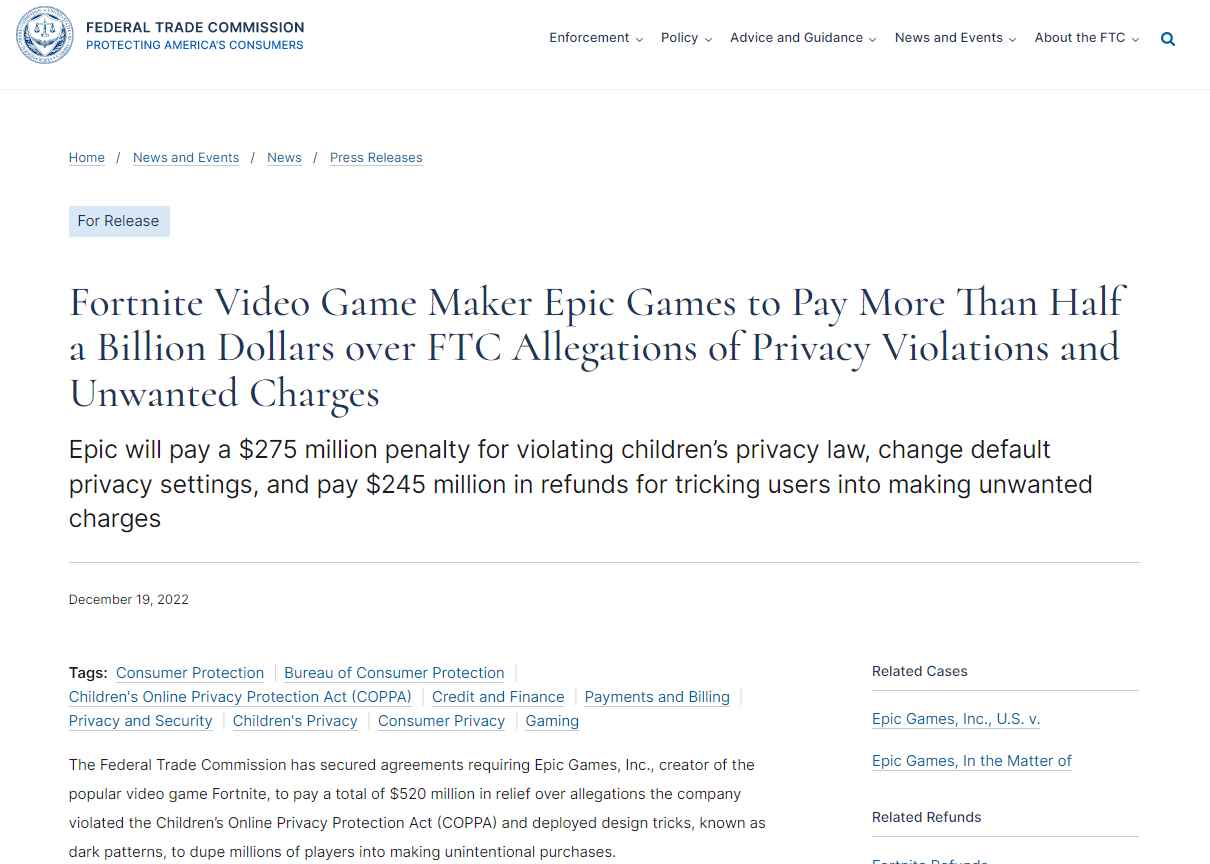Epic Games, with headquarters in Cary, North Carolina, is responsible for creating some of the most well-known and critically acclaimed video games and game engines, such as Fortnite, Gears of War, and Infinity Blade. Fortnite, the company’s breakout game, has around 400 million registered users in 2021. Children and teens are the game’s primary demographic of players.
In a lawsuit submitted to a federal court, the FTC said that Epic had violated COPPA by gathering information from kids without getting their parents’ permission and had engaged in unfair business practices by automatically allowing real-time voice and text chat for kids and teenagers.
As early as 2017, workers of Epic pushed the firm to modify the default settings to require users to opt in for voice chat, noting worry about the effect, in particular on youngsters, that the move might have. This was stated in the FTC’s notice. “Despite this and allegations that children had been harassed, even sexually, while playing the game, the corporation resisted turning off the default settings.” “Despite this and claims that children had been harassed, including sexually, while playing the game.”
In the complaint regarding the dark pattern, the FTC alleged that Epic used deceptive practices to trick users into making purchases, including charging account holders without their authorization and blocking access to previously purchased content. These practices were described as “counterintuitive, inconsistent, and confusing button configuration.”
The Federal Trade Commission (FTC) said that Epic “ignored more than one million consumer complaints and repeated staff warnings that ‘massive’ numbers of users were being unjustly charged.” “In point of fact, Epic’s modifications have simply served to make the situation worse… Using their own internal testing, Epic hid the cancel and refund buttons on purpose so that users would have a harder time finding them.

Epic issued a statement on Monday in which it addressed the claims made by the FTC and outlined a number of actions that it has already done and plans to take in the near future.
According to the statement made by the corporation, “the previous status quo for in-game commerce and privacy has altered, and many developer practices should be reviewed.” “We share the core values of fairness, openness, and privacy that are enforced by the FTC, and the methods cited in the FTC’s complaints are not how Fortnite works at all,” the statement said. We will continue to be forthright with players about what they may anticipate when making purchases, make sure that it is easy to cancel orders and get refunds, and add protections that assist in maintaining an environment that is both secure and enjoyable for gamers of all ages.
According to the body that supervises the enforcement of antitrust and consumer protection laws, the deal comprised of two distinct settlements that each broke records in their own right. One of them is a penalty in the amount of $275 million for breaking the Children’s Online Privacy Protection Act, which was brought about by a court order that was issued by the Department of Justice on behalf of the FTC (COPPA). According to the FTC, this is the greatest penalty that has ever been levied for breaking one of its rules. As part of the settlement, Epic will be obliged to implement “strong privacy default settings for children and teenagers.”
The second case was an injunction requiring Epic to pay $245 million in order to reimburse clients for the dark pattern and billing practices the company had used. It is the biggest administrative order in the history of the United States as well as the Federal Trade Commission’s (FTC) greatest return sum in a case involving gaming.
Information security specialist, currently working as risk infrastructure specialist & investigator.
15 years of experience in risk and control process, security audit support, business continuity design and support, workgroup management and information security standards.
